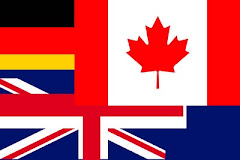I have spoken regularly over the years to our local genealogical society. Part of my work in the library was to teach staff mainly about how to use the library management systems. Since retirement, I have taught classes to the reference staff at the library on genealogy and answering genealogy and local history reference questions. I also have been working as a volunteer with the local historical society the last couple of years, teaching our research committee research methodology.
This night school class is going to be fun as it is a small group of eight who are very interested in learning about genealogy. I sense that they are interested in methodology and learning good skills so they can effectively use different resources.
With a small group, we will be able to interact and still cover quite a bit in the twelve hour course (three hours each night) but in that length of time I can provide only a taste of each topic we cover.
Week One - What did we cover?
I used PowerPoint to illustrate my talk.
Introduction of each other and of the course. The course will focus on Ontario records but others will be used to illustrate different points.
- Genealogy vs Family History
Basic Genealogy Processes, etc.
- Sources - Original & Derivative
- Information - Primary & Secondary
- Evidence
- Genealogical Proof Standard (a quick mention)
- Research Process - Having a plan
Then, I presented my ongoing research into finding the parents of my great grandmother, Emily Iles (nee Pugh). This showed starting with known information, information in obituaries, examples of conflicting information, use of Census records in Canada and England, getting help from someone on a mailing list, getting marriage and birth registrations from England, information gained from a website but is no longer available, information found on an extraction but how more and vital information is available on the original record, looking at names of witnesses and how the research still continues.
After a short break, they filled in a questionnaire so I could get further information on their level of experience in a number of areas and their interest in particular geographic areas.
We continued by looking at some of the basic ideas about genealogical research including home is where your story begins.
The last part of the evening was a look at census records. One important reminder in this area was to look at all images concerning a household not just the first image and also to look at the agricultural census. For one household, on the agricultural schedule, it states that only children were at home. I wonder who provided the family information.
We had a few minutes to look at http://www.automatedgenealogy.com/ This site, prepared by volunteers, provides searchable indexes and extractions of Canadian census and then linked to images at Library and Archives website. It includes the 1851/2 census for Canada (now Ontario and Quebec), New Brunswick is in process, the 1901 Canadian census, the 1906 census for Western Canada, the 1911 Canadian Census
We found the father of one of the students on the 1901 and 1911 census.
To prepare for week two, the students are to fill in a family group sheet for either their birth family or their current family and a pedigree chart with what they know.
They are also to bring with them one or two documents/sources of family history that might be useful in their research. We will discuss these next week and ask and answer questions about what is learned, who provided the information, and whether we are looking at original or derivative sources and whether the information is primary or secondary.
Next week's topic will be birth, marriage and death related records/sources.
A very full evening for everyone but I had the feeling that everyone was enjoying the process so far.





Janet - What a great opportunity to share what you know and your love of genealogy with a new group of genealogists! This is a great thing! I can't wait to hear more on how your class is going!
ReplyDeleteHi Janet ~
ReplyDeleteSounds like a great class! And I appreciate the link to the Automated Genealogy site. I have SO much to learn about research in Canada. Hope to put my upcoming trip to the Ontario Genealogical Society Conference to good use. In the mean time, I'll be watching to see what else you are teaching your students.
Thanks Cindy and DianaR I will do an update next week after the class.
ReplyDeleteDiana when you come to the Ontario Genealogical Society Conference, in the vendors' marketplace the Association of Professional Genealogists Ontario Chapter will have a table and will do 15 minute free consultations so if you have a specific question that you need help with, you can ask one of the consultants.
Enjoyedyour description of the first class. I know you will enjoy the class and the students will learn so much from you! Thanks for sharing!
ReplyDeleteJanet ~ Thanks! I am working now on trying to get everything organized so that I know what my questions are. I'll give some thought to that 15 minutes :-)
ReplyDelete